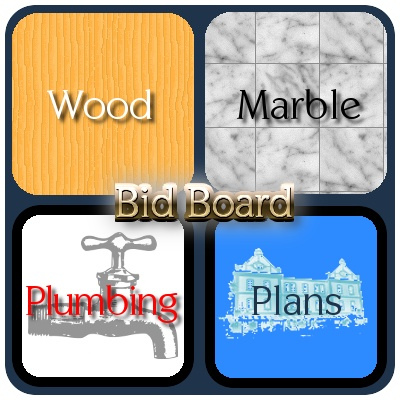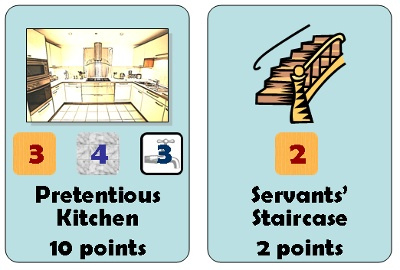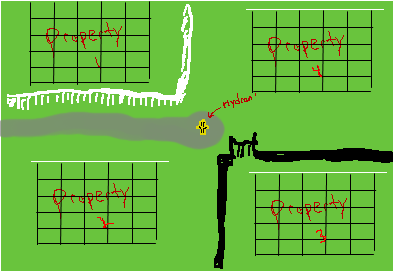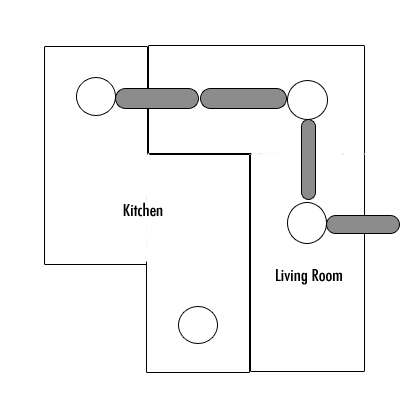May 2010 Game Design Showdown - "Home Improvement"
Please Read: Details on entering the Game Design Showdown.
This Challenge has been completed.
Congratulations to the winner of this month's Game Design Showdown with 8 votes:
- "Real Estate Madness" by Simon Stump (simons)
Congratulations to the runners up as well, tied at 6 votes apiece:
- "Mansion" by Dave Dobson (dobnarr)
- "Cul de Sac" by Richard Durham
Main Design Requirements:
Theme Restriction: Home Improvement.
The theme of this month’s GDS is remodeling or renovating a home. There is no Mechanics restriction perse, but the game must feature each of the following aspects in some way:- Rules: There are always rules imposed by people when it comes to remodeling or renovating. Maybe these rules are imposed by the City or County (building permits), maybe by a Home Owner’s Association, or maybe by the Building Code. The game must address such rules in some significant way.
- Plumbing: When adding onto a house, plumbing can be a very large expense. Perhaps adding a bathroom is somehow ‘better’ for the player, but the additional cost of plumbing weighs against that. In some way the game must address plumbing as an important consideration.
- Plans: Before any construction can be done, the contractor will need a set of plans – Floor plans, Electrical plans, Plumbing plans, Structural plans… The showdown requires that players address this need for plans as a significant factor of the game. It is up to the entrant to decide in what way they factor in.
- Building Materials: Another important consideration is materials of construction. Will you build out of masonry, or will you use wood framing? Those are the most common for use in homes. Maybe one is more expensive than the other, maybe one is more prestigious than the other, or maybe one is more available than the other. The game must address this dichotomy (wood vs masonry), or at least address building materials, in some non-trivial way.
To be clear, each of these restrictions should be addressed, but while some may be the focus of the game, others could be addressed peripherally. I don't expect to see a single game focusing on each and every one of these items in detail!
- Mechanics Restriction: None.
As mentioned above, there is no Mechanics restriction this month. Instead, there are some very specific thematic restrictions. I hope to see some entries who’s mechanics really evoke the theme. - Bonus: No bonus theme or mechanism this month.
- CRITIQUES: After voting has closed the entries will be posted for comments and critiques. Post constructive critiques and commentary about the entries to this Challenge in the Critiques Thread
Comments or Questions: Comments and questions about this Challenge were handled on the Comments Thread.
GDS Details: For more details on how these Game Design Showdown Challenges work, especially the details around the word count and graphics limits, visit the GDS Wiki Page. Enjoy!
-Seth









Short Sale
A game for 2-5 players
Playing time: 90 minutes
Game mechanics: point-to-point movement, economic, negotiating, commodity speculation
OVERVIEW:
A game about investing in and renovating properties.
Players begin with an income of $200k from your current employment. You work 8 hours a day, leaving another 8 hours for investing and renovating. If you can quit your job and live off of rents alone this gives you additional freedoms and advantages when buying, selling, bidding, as well as first shot at short sale situations.
You can borrower money from a bank at a certain rate of interest. When another player borrows money, rates go up. When a player pays off a loan, or when borrowing is slow, rates come down.
Players may invest in:
24 single family residences.
16 2-family properties.
8 4-family properties.
There are 6 different districts of the residential city of Homewood. Each time a person buys a property in a district, the values of the other properties go up. If a property is sold, the value of the properties goes down.
If a player is unable to pay their mortgage from shortage of funds or job loss (event card), the home is under foreclosure and short-sale. While short-sales takes longer to acquire, they can be purchased at a great discount.
Different paths to victory and victory points: players can spend their time buying and selling properties. They can also renovate the properties they own, which adds value to the surrounding properties in the district, as well as increase rents from rental properties.
There is also a General Event deck that happens in phase 4, possibly affecting everyone or only a certain district of properties.
Phases:
Further details:
PHASE 1 – Districts are rated 1-6 (1 being most affluent/successful) according to:
PHASE 2 – COLLECT RENTS AND INCOME
PHASE 3 – UPKEEP
Players pay any mortgages they’ve taken out, plus real estate taxes (see district chart)
PHASE 4 – GENERAL
PHASE 5 – EVENT DECK
An event card is drawn which announces something that may affect a player, all players, a district, a particular home, a job, or a market. Some examples:
PHASE 6 – CHECK FOR GAME WIN CONDITIONS
At the beginning of the game, a pool of victory points is placed next to the game board depending on the number of players. In Phase 5, players acquire victory points based on:
DISTRICT CHART (formatting may be lost in translation)
District number: District1 ----- District2 ----- District3 ----- District4 ----- District5 ----- District6
One family rent: $1550 ------- $1475 ------- $1400 ------- $1325 ------- $1200 ------- $900
Two family rent: $1200 p.u. --- $1150 p.u. --- $1100 p.u. --- $1050 p.u. --- $950 p.u. --- $700 p.u.
Four family rent: $1000 p.u. ---- $900 p.u. ---- $800 p.u. ---- $700 p.u. ---- $600 p.u. ---- $400 p.u.
Real estate tax : $3000 ------- $2500 ------- $2000 -------- $1500 -------- $1000 -------- $1000